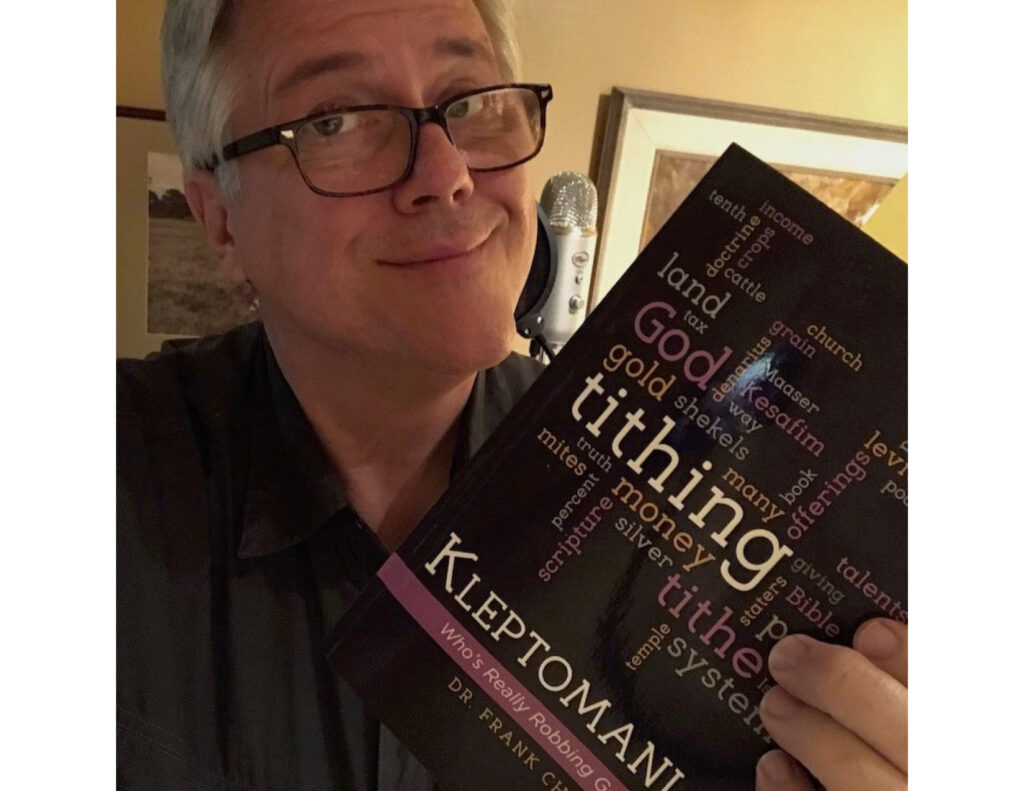
I am often amazed that no matter what you do to clarify scriptural inaccuracy, it seems to fall on deaf ears. The doctrine of the traditions of men always overshadows the hermanuetical accuracy of scripture. The traditions of men phenomenon as it relates to monetary tithing definitely set itself up in the pro-tithing community as unadulterated fact that cannot be disputed. And to do so brings the wrath of religious leaders of all different strips.
The monetary tithe doctrine is so powerful because it preys on the human need for materialism and unimaginable wealth. I for certain, having full knowledge that I could not afford to tithe ten percent of my income did so because of the persuasive nature the tithe teachings. There were other psychologies that played a role in me not only paying ten percent of my income but going so as to pay 10 percent of my gross income. How does the false teachings of monetary tithing play in role in the psychology of giving. Growing up poor and suffering lack does have an impact on how one see wealth as a way out. As pastors teach non-biblical monetary tithing and along with the appetizing promises that God richly blesses people with abundance if they only bring their tithes to the storehouse, that sets up a behavior pattern to seek a way out of poverty and lack. So you give to get or you hear sermons that state you can’t out-give God. The misinterpretation of scripture that God will bless you 30, 60 and 100 fold only if you bring your tithes and offerings is hard not to swallow. I took the bait and coughed up tithe money in hopes that God would open the windows of heaven and pour me out blessing that I did not have room to receive. This false theological doctrine is so inviting, it’s easy to see why many people can’t including myself could not see the inaccuracy of scripture. For decades, I paid ten percent of my gross and net income in hopes that God would rain down abundant blessing in my life. Needless to say, it was a colossal failure that led to financial ruin and bankruptcies.
Down through the years I considered myself to be a very meticulous studier of the Bible. But looking back, I can recall that I never really studied or researched the authenticity of monetary tithing. Because of my background, I can see why I could have suspended my logic and suspicion about the practice of paying the institutional church ten percent of my income in perpetuity. I was simple driven by my need to get out of some financial fixes. Prior to discovering the true nature of biblical tithing and writing my book, Kleptomaniac: Who’s Really Robbing God Anyway, I was headed toward bankruptcy again because I was paying tithes gross income to get God to bless me with wealth so I could suffering lack. In essence, I was just paying money to get money. You have to understand that people who truly think paying tithe money is a blessing do not understand that tithing money is of no concern to God, but that they are simply blessed because they gave from their heart irrespective of percentage. In the scripture God loves cheerful givers. He never said anything about percentage givers.
The ten percent tithing psychology set up in my mind through scriptural eisegesis created a thinking pattern and a giving psychosis that lead to me giving in ways that moved me closer to another financial chaos. For 30 plus years, I was stuck in this tithe stronghold paying the money and at the same time still skeptical about what I was doing. It was a vicious cycle because fear that kept me from really researching the truth about the subject. Another element involved in this dynamic is if I found out the truth about tithing, I could lose relationships with other believers. When I finally discovered the truth about tithing, everything changed in my life. It’s been seven years now since I’ve stopped tithing money and have written, Kleptomaniac: Who’s Really Robbing God Anyway and its been a journey indeed. I can honestly say that I don’t know if the stronghold of monetary tithing in Christendom has any less impact or that many people’s minds have changed through personal study, but I do realize that writing a book about tithing does add to the conversation. However, I would say that personal biblical study on the subject of tithing is probably the most impactful way to discover the truth about what God really wants as a tithe.
It is important that you examine every teaching you hear in church, especially those concerning money. Don’t follow the crowd because it’s not in your benefit to have the scriptural wool pulled over your eyes. Author Leonard Bupanda wrote, “If the tithe were that important, wouldn’t have Abraham intensified the frequency of giving after coming face to face with God? Evidently, not even God raised the issue of the tithe with Abraham at all. Instead, God demanded a better proof of Abraham’s higher degree of obedience and faith when He requested Abraham to give Him Isaac, his only son, as a sacrifice.” “The Tithing Dilemma And The Triumphs Of Love.” iBooks. https://books.apple.com/us/book/the-tithing-dilemma-and-the-triumphs-of-love/id481637695.
The may sound crazy, but it is possible for people to be robbed in church with false teachings about God and money. Chis De Wet wrote, “today the examples we see from so many “leaders” in the “church,” is that they drive around in luxury vehicles, lording it over the flock, while many of the flock can barely survive a normal life. The flock is constantly told that they will receive back a hundred fold, if they tithe into the storehouse. Some of the people are so eager to give because of this promise, that they arrange second bonds on their homes, to give to the “church.” They were told that God would bless them, a hundred fold. But when that blessing does not come, what then? Thoughts like: is there really a God? Why did God reject me? Come to mind. Many times this leads to broken homes as well as divorce, but also a rejection of Christianity. How can God ordain this, unless it is not of Him but of the doctrines of men, which His Word warns us to avoid at all costs?”
FranksChase-KleptomaniacMedia kit2020
Chis is exactly right, when the blessings did not come from paying ten percent and my financial situation worsened over the decades, I began to have second thoughts about the existence of God, but because I sought knowledge for truth I did not throw out God with the bath water. I studied the subject and concluded that I was robbed in the Sunday morning tithing stickups because when preachers and those with theological degrees study the original language and do not apply the truth about tithing but keep silent and do not come forward to the congregation, they become the real Kleptomaniacs who are robbing God’s people of the truth.
Understanding the Bible means you must have a good grasp on the times, cultures and practices of the time. Anyone who studies biblical matters always considers the times, cultural practices and habits of the people. So since Paul was a Hebrew of Hebrew, and he knew his culture as a jew then the fact is “given Jews are taught to work to support themselves, including those who teach the Tora [scriptures], why don’t full-time ministry preachers and pastors have the same wherewithal to be independent by working like Paul? If they did, they would not need to depend on the congregation for their livelihood, which is extremely problematic when personal homes, church mortgages, rents and building funds are involved. As long as pastors find scriptural loopholes that provide incentives to not work, people will keep tithing under the false belief that God commands tithing under grace. It is a scandalous shame to rely on someone else for every need in life and not have some self-sufficiency.” Excerpt From: Dr. Frank Chase, Jr., Th.D. “Kleptomaniac.” iBooks.
Author Russell Earl Kelly wrote in an article titled, Tithing Is Not a Christian Doctrine, that “tithing failed national Israel and it has also failed the Church (Heb 7:12-19). Churches showcase success stories but fail to mention the testimonies of those who have tithed for generations without escaping poverty. Today the very lowest income class pays the largest percentage to charity. Yet most remain in poverty. Meanwhile many atheists become wealthy by simply following principles of money management which also makes many tithers successful. Neither the lottery, nor the tithe is a magic get-rich-quick answer to replace education, determination and hard work. If Malachi 3:10 really worked for New Covenant Christians, millions of poor tithing Christians would have escaped poverty and would have become the wealthiest group of people in the world instead of remaining the poorest group. There is no evidence that the vast majority of poor tithe-payers are ever blessed financially merely because they tithe. The Old Covenant blessings are not New Covenant blessings (Heb 7:18-19; 8:6-8, 13).
In God’s Word, tithe does not stand alone. It is the tithe of FOOD. The HOLY biblical tithe was very narrowly defined and limited by God Himself. True biblical tithes were always: (1) only food, (2) only from the farms and herds, (3) of only Israelites, (4) who only lived inside God’s Holy Land, the national boundary of Israel, (5) only under Old Covenant terms and (6) the increase could only be gathered from what God produced.
Therefore, (1) non-food items could not be tithed; (2) clean wild game animals and fish could not be tithed; (3) non-Israelites could not tithe; (4) food from outside God’s holy land of Israel could not be tithed; (5) legitimate tithing did not occur when there was no Levitical priesthood; and (6) tithes did not come from what man’s hands created, produced or caught by hunting and fishing.” Copyright® 2010 Russell Earl Kelly
“Most church historians write that tithing did not become a legally enforced doctrine in the church for over 700 years after the cross. According to the very best sources it took over 500 years before a local church Council of Macon in France, in the year 585, tried unsuccessfully to enforce tithing on its members. It was not until the year 777 that Charlemagne legally allowed the church to collect tithes. That is the history of tithing found in the Encyclopedia Britannica, Encyclopedia Americana and the Roman Catholic Encyclopedia”. [ibid]
In reality, the whole tithing doctrine foundation preached today rests on Abram who gave a one time tithe to Melchizedek. It is a weak foundation because Abram did not tithe from his wealth but from the spoils of war he took from defeated kings in battle. The fact the Abram tithe from other people goods presents a problem for modern pro monetary tithe teachers. Author Michael Morrision, wrote in an article titled, Sabbath, Circumcision, and Tithing that ” The first biblical mention of tithing is in Genesis 14. After four foreign kings had taken Lot captive, Abraham attacked them and recovered all the booty. After his victory, the king of Sodom came out to meet him, and so did Melchizedek, a priest of God. Melchizedek blessed Abraham, and then Abraham “gave him a tenth of everything” (Genesis 14:20). The text does not tell us whether Abraham had ever tithed before, or ever tithed afterwards. But it does show that Abraham was generous. He gave the rest of his booty to the king of Sodom (verses 23-24). Abraham kept all of God’s laws that were relevant in his day (Genesis 26:5), but Genesis does not tell us whether tithing was a law in Abraham’s day. Many of God’s decrees and requirements were built around the nation of Israel and the Levitical priesthood and tabernacle. Abraham could not have kept such decrees and laws.”
“The erroneous tithing phenomenon that people follow today has prominence because many believers have not seriously studied the subject. When some Bible teachers talk about tithing and giving, they unwittingly or purposefully combine the distinct separate terms to mean the same thing. In doing this, they reconstruct the biblical food tithe into a monetary tithe based on a false premise that creates unbiblical giving patterns.
When preachers told me that tithing was a non-negotiable command for believers, I outwardly accepted the tithe doctrine without question; however, inwardly my theological struggle persisted and my mind swelled with questions. I never spoke up to pastors who I respected as credible authority figures when they preached about tithing but when I decided to practice post-tithe free-will giving, all hell broke loose. In the aftermath of all the drama, my family and I had no choice but to leave our former church. The response I encountered after my decision was not one of endearment, but one of utter disdain for departing from what some call a time-honored tradition. People treated me like I had blasphemed the Holy Ghost by embracing a different form of giving. As I experienced backlash for not tithing, it brought me to four turning points in my life. Even though turning points are annoying and demanding, God uses them to strengthen and provide spiritual growth resulting in positive change. Here is how they worked out in my life.
1.The characteristics of my turning points took place in the normal routine of my daily life. I discovered the fallacies of tithing as an act of purposeful, routine Bible study.
2.Discovering that tithing was not money happened unexpectedly.
3.The truth about tithing will influence my life forever.
4.I know that God ordained me to discover the truth about the varied forms of tithing because He authored these turning points in my spiritual journey as a result of my wife’s prayer for a short break from tithing for financial reasons.” Excerpt From: Dr. Frank Chase, Jr., Th.D. “Kleptomaniac: Who’s Really Robbing God Anyway?” iBooks.

Randolf is Reading
Once I wrote the book, I wrote many blog article posts for Kleptomaniac: Who’s Really Robbing God Anyway? on my website for all to read, learn and share. I am thankful for the that has happened in my discovery of the true tithe God required in the Bible. No longer will I be the victim of a Sunday morning tithing stickup.
“Preachers who know what the real tithe is in the Scriptures do not actually tell the whole truth. However, they spin, confuse, juxtapose, obfuscate and equivocate concerning the real tithing facts by weaving stories together about tithing benefits, which sound true, but are not. When you study tithing, it is not hard to uncover the weaknesses of modern tithe teachings. Throughout the ages, tithing has been virtually unchallenged by the Christian masses and remains so until this day. The great tragedy about tithing is that seminaries, theological schools and Bible colleges know the truth about the original tithe, but fail to educate Bible students on the subject. Biblical education is becoming a system of learning that is rote. Memorizing phrases and concepts, and writing papers that regurgitate the mind of the professor instead of the mind of Yahweh does not constitute legitimate biblical scholarship. Independent thinking is neither required nor expected in some theological schools. However, the ability to challenge, perform critical analysis and evaluate specific subjects, especially tithing, is not required. If tithing truths are in plain sight in the Bible, then why is the information not shared with the masses in congregations? Excerpt From: Dr. Frank Chase, Jr., Th.D. “Kleptomaniac: Who’s Really Robbing God Anyway?.” iBooks.

Knowing the truth about tithing means you can always leave church with your head held high knowing that you are not or ever have been a man or a woman who has robbed God of tithes and offerings. However, if you have participated in the ten percent Sunday morning tithe stickup, you can give what your heart desires without any obligation to percentage because God never requires monetary tithes but He did require tithes from livestock and crops.

Book Award


Recent Comments